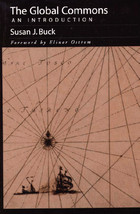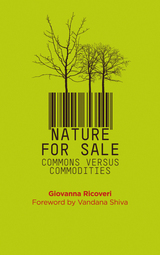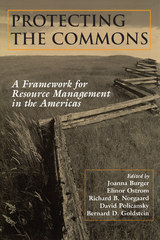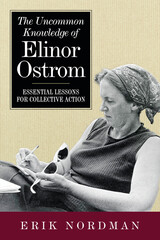
In this innovative study of the rise of the conservation ethic in northern New England, Richard Judd shows that the movement that eventually took hold throughout America had its roots among the communitarian ethic of countrypeople rather than among urban intellectuals or politicians. Drawing on agricultural journals and archival sources such as legislative petitions, Judd demonstrates that debates over access to and use of forests and water, though couched in utilitarian terms, drew their strength and conviction from deeply held popular notions of properly ordered landscapes and common rights to nature.
Unlike earlier attempts to describe the conservation movement in its historical context, which have often assumed a crude dualism in attitudes toward nature--democracy versus monopoly, amateur versus professional, utilitarian versus aesthete--this study reveals a complex set of motives and inspirations behind the mid-nineteenth-century drive to conserve natural resources. Judd suggests that a more complex set of contending and complementary social forces was at work, including traditional folk values, an emerging science of resource management, and constantly shifting class interests.
Common Lands, Common People tells us that ordinary people, struggling to define and redefine the morality of land and resource use, contributed immensely to America's conservation legacy.

Vast areas of valuable resources unfettered by legal rights have, for centuries, been the central target of human exploitation and appropriation. The global commons -- Antarctica, the high seas and deep seabed minerals, the atmosphere, and space -- have remained exceptions only because access has been difficult or impossible, and the technology for successful extraction has been lacking. Now, technology has caught up with desire, and management regimes are needed to guide human use of these important resource domains.
In The Global Commons, Susan Buck considers the history of human interactions with each of the global commons areas and provides a concise yet thorough account of the evolution of management regimes for each area. She explains historical underpinnings of international law, examines the stakeholders involved, and discusses current policy and problems associated with it.
Buck applies key analytical concepts drawn from institutional analysis and regime theory to examine how legal and political concerns have affected the evolution of management regimes for the global commons. She presents in-depth case studies of each of the four regimes, outlining the historical evolution of the commons -- development of interest in exploiting the resource domain; conflicts among nations over the use of the commons; and efforts to design institutions to control access to the domains and to regulate their use -- and concluding with a description of the management regime that eventually emerged from the informal and formal negotiations.
The Global Commons provides a clear, useful introduction to the subject that will be of interest to general readers as well as to students in international relations and international environmental law, and in environmental law and policy generally.

Nature for Sale uncovers the rich heritage of common ownership which existed before the dominance of capitalist property relations. Giovanna Ricoveri argues that the subsistence commons of the past can be reinvented today to provide an alternative to the current destructive economic order.
Ricoveri outlines the distinct features of common ownership as it has existed in history: cooperation, sustainable use of natural resources and decision-making through direct democracy. In doing so, she shows how it is possible to provide goods and services which are not commodities exchanged on the capitalistic market, something still demonstrated today in village communities across the global South.
Tracing the erosion of the commons from the European enclosures at the dawn of the Industrial Revolution to the new enclosures of modern capitalism, the book concludes by arguing that a new commons is needed today. It will be essential reading for activists as well as students and academics in history, politics, economics and development studies.

Commons—lands, waters, and resources that are not legally owned and controlled by a single private entity, such as ocean and coastal areas, the atmosphere, public lands, freshwater aquifers, and migratory species—are an increasingly contentious issue in resource management and international affairs.
Protecting the Commons provides an important analytical framework for understanding commons issues and for designing policies to deal with them. The product of a symposium convened by the Scientific Committee on Problems of the Environment (SCOPE) to mark the 30th anniversary of Garrett Hardin's seminal essay “The Tragedy of the Commons” the book brings together leading scholars and researchers on commons issues to offer both conceptual background and analysis of the evolving scientific understanding on commons resources. The book:
- gives a concise update on commons use and scholarship
- offers eleven case studies of commons, examined through the lens provided by leading commons theorist Elinor Ostrom
- provides a review of tools such as Geographic Information Systems that are useful for decision-making
- examines environmental justice issues relevant to commons
Contributors include Alpina Begossi, William Blomquist, Joanna Burger, Tim Clark, Clark Gibson, Michael Gelobter, Michael Gochfeld, Bonnie McCay, Pamela Matson, Richard Norgaard, Elinor Ostrom, David Policansky, Jeffrey Richey, Jose Sarukhan, and Edella Schlager.
Protecting the Commons represents a landmark study of commons issues that offers analysis and background from economic, legal, social, political, geological, and biological perspectives. It will be essential reading for anyone concerned with commons and commons resources, including students and scholars of environmental policy and economics, public health, international affairs, and related fields.


In The Uncommon Knowledge of Elinor Ostrom, author Erik Nordman brings to life Ostrom’s brilliant mind. Half a century ago, she was rejected from doctoral programs because she was a woman; in 2009, she became the first woman to win the Nobel Prize in Economics. Her research challenged the long-held dogma championed by Garrett Hardin in his famous 1968 essay, “The Tragedy of the Commons,” which argued that only market forces or government regulation can prevent the degradation of common pool resources. The concept of the “Tragedy of the Commons” was built on scarcity and the assumption that individuals only act out of self-interest. Ostrom’s research proved that people can and do act in collective interest, coming from a place of shared abundance. Ostrom’s ideas about common resources have played out around the world, from Maine lobster fisheries, to ancient waterways in Spain, to taxicabs in Nairobi. In writing The Uncommon Knowledge of Elinor Ostrom, Nordman traveled extensively to interview community leaders and stakeholders who have spearheaded innovative resource-sharing systems, some new, some centuries old. Through expressing Ostrom’s ideas and research, he also reveals the remarkable story of her life.
Ostrom broke barriers at a time when women were regularly excluded from academia and her research challenged conventional thinking. Elinor Ostrom proved that regular people can come together to act sustainably—if we let them. This message of shared collective action is more relevant than ever for solving today’s most pressing environmental problems.
READERS
Browse our collection.
PUBLISHERS
See BiblioVault's publisher services.
STUDENT SERVICES
Files for college accessibility offices.
UChicago Accessibility Resources
home | accessibility | search | about | contact us
BiblioVault ® 2001 - 2024
The University of Chicago Press









